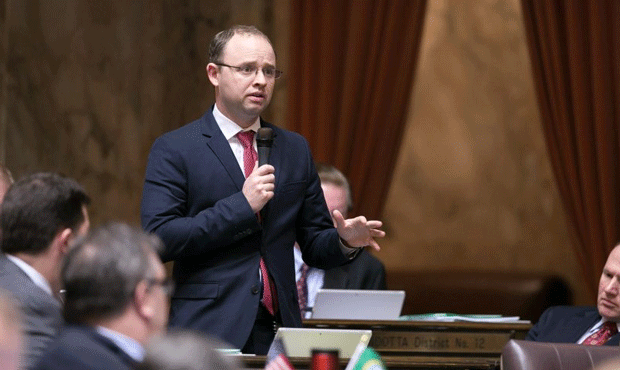Sound Transit’s $5 parking proposal is another ‘money grab’
Dec 28, 2017, 5:50 AM | Updated: 2:14 pm

Washington State Representative Morgan Irwin. (Washington State House Republicans)
(Washington State House Republicans)
A Washington state lawmaker is calling foul on Sound Transit’s plan to charge $5 for parking once future transit stations come online.
“Most folks out here are finding out about this and are losing their minds,” told the Jason Rantz Show. “They are saying, ‘Wait a second, we already think we are paying too much. Now we are paying an extra $1,250 a year just to park our car.’ That’s crazy.”
RELATED: Legal expert says ST3 procedure violated Constitution
Irwin represents the state’s 31st District, which includes Auburn, Bonney Lake, and Sumner. He points out that many of Sound Transit’s future projects coming to his region will include parking garages and other parking facilities, and the transit agency plans to charges $5 a day to use them. Irwin argues that residents are already paying $1,500-2,000 per household for ST3, not to mention car tab fees.
The $5 parking charge seems like another “money grab” to him.
For Irwin, it’s a perfect example of two hot-button political issues: the divide between rural and urban Washington; and the need for a truly representative Sound Transit board.
Rural vs. urban Washington
Irwin reports that agency officials sometimes say that if project funding is cut, things like parking garages will have to go. He said that he has talked with Sound Transit authorities about how they expect rural residents to handle the parking costs, or what they will do if there is nowhere to park at a transit station.
“And they look at me, and they absolutely mean this, and say, ‘Well, they’ll just take the bus,’” Irwin said. “There is no bus! There is no bus in rural King County, there is no bus in rural Pierce County. There is no bus. These folks don’t live in cities, that’s why they are taking Sound Transit to get there. Which is why it will be a huge impact for $5 per day for rural commuters – to have (ST3) jammed down their throat, most of them didn’t vote for it, and now they are going to end up paying more than anyone else for a project they didn’t want.”
“As a lawmaker who represents a rural part of the state, this is one of those really tough issues we are always talking about in Olympia saying there’s this growing rural-urban divide,” he said.
Unaccountable Sound Transit
is made up of local elected officials from cities and counties. They are appointed to the board. This dynamic has caused great concern over the representation, especially for an agency in charge of considerable taxes.
“I’m not a big gotcha politics kind of guy, so let me say this and I really mean it – the folks on the Sound Transit board, most people have no idea who their representative is on the board because they are appointed,” Irwin said. “… there’s like two people off the Lakewood City Council that are on the Sound Transit Board. Two people off a small city council. They’re smart folks, it’s not that they are bad. It’s just that there is no way they can represent Graham, and Puyallup, and Bonney Lake, and Sumner. They don’t live there.”
“It’s not a matter of being anti-rural, it’s more of ‘where’s that on the map again?’” he said. “… we live in a society based on representation and we have a $50 billion-plus board that has zero representation of huge chunks of people who are being taxed.”
RELATED: Could voters choose Sound Transit’s board?
Irwin is one lawmaker who has been fighting to change Sound Transit’s structure. He promotes an elected board instead of the current appointed one.
“We need to hold people directly responsible by having direct elections,” he said. “You have to have a desk to come in and slam your fist down on.”
“I believe we do need some sort of transit fix in the central Puget Sound region,” Irwin said. “We probably needed it in the ’70s … it didn’t happen. Now we have a chance to do it. But if we don’t make people feel involved, eventually this thing will blow up. People have to know they are heard. If they continue to feel unheard, there is going to come a time for ST4 … there’s no way that passes.”
In the meantime, Irwin strongly encourages residents within Sound Transit’s districts find out who their is and make their voices known.














